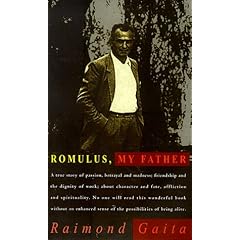 Amazon Link: Wake in Fright
Amazon Link: Wake in FrightThe back cover reads:
“In one magnificent rough-and-tumble of a first novel, the gargantuan flavour of the Australian outback, its sick heat and its people. Like quicksand their animal customs, their animal women, their perverts and their stupendous, overpowering hospitality drag innocent, city-bred John Grant down to his ruin – and beyond.”
John is a school teacher in a remote outback town. The story starts on the last day before summer break, as the students file out of the dusty classroom, John considers the summer ahead of him – a long idyllic break in
When he reaches the next town he is parched and frustrated. The bus doesn’t leave until the next morning. With a night to kill, he books into a hotel and goes to the bar for a drink. He’s not interested in socializing, just quenching his thirst and passing time before he can escape the barrenness. After one drink he is offered more, encouraged to share a beer with the locals. It would not be good manners to decline, in fact, it would be downright offensive. John doesn’t want trouble, and he is thirsty, so he agrees.
Soon, he’s had too many, he’s hungry and isn’t thinking straight. The local policeman offers to take him to a place that serves great steak – a dusty back-end of a hotel where a game of Two-up is in progress. The steak is bad, the policeman abandons him and John is drawn, moth-like, into the game. It’s a serious affair, almost ethereal in its intensity. He drinks more, bets and wins. He now has enough money to live it up in
The story, written in sombre tones, an almost hallucinogenic quality to John’s experiences, goes into dark territory from here on out. John loses all his money, and with no way to leave the town he’s trapped in a hell-hole of his own creation. A local man takes pity on him, takes him in, gives him a bed and more alcohol. John readily imbibes, fragmenting his already hazy intuition and leaving himself even more vulnerable.
He is pushed into joining a hunting party, a group of older men who take him out, shove a rifle in his hands and teach him to shoot kangaroos. It’s not hunting though, it is carnal slaughter – horrific, bloody, a deranged, alcohol driven orgy of unimaginable violence. John is both sickened and thrilled. Despite dreadful unease about the acts and his companions, he participates then relies on alcohol to numb the horror of what he’s done.
Eventually, after a black-out whereupon he wakes with a hollow sense of something being amiss, he abandons the house and attempts to hitch a ride to
This book shows a darker side to the outback, beyond the glossy postcard pictures and cutesy tales of small town hospitality. Country living sets aside the gentility of suburbia, favouring a rawer, animalistic nature to its inhabitants. The book is well written, a fast read but well worth it. The writing is powerful and polished, and no other book has managed to turn my stomach with scenes of graphic horror than the frenzied killing sprees that John is drawn into.
There’s a nice blend of introspection and a well formed logic that sees this story through. John spends most of the book in a drunken daze, yet instinctually he recognises he’s in trouble. The reader, from the very first page, is drawn forward by that same recognition, and left with a sense that something more disturbing may have occurred, something that eroded the very fabric of who John was.















 Amazon Link:
Amazon Link: 



